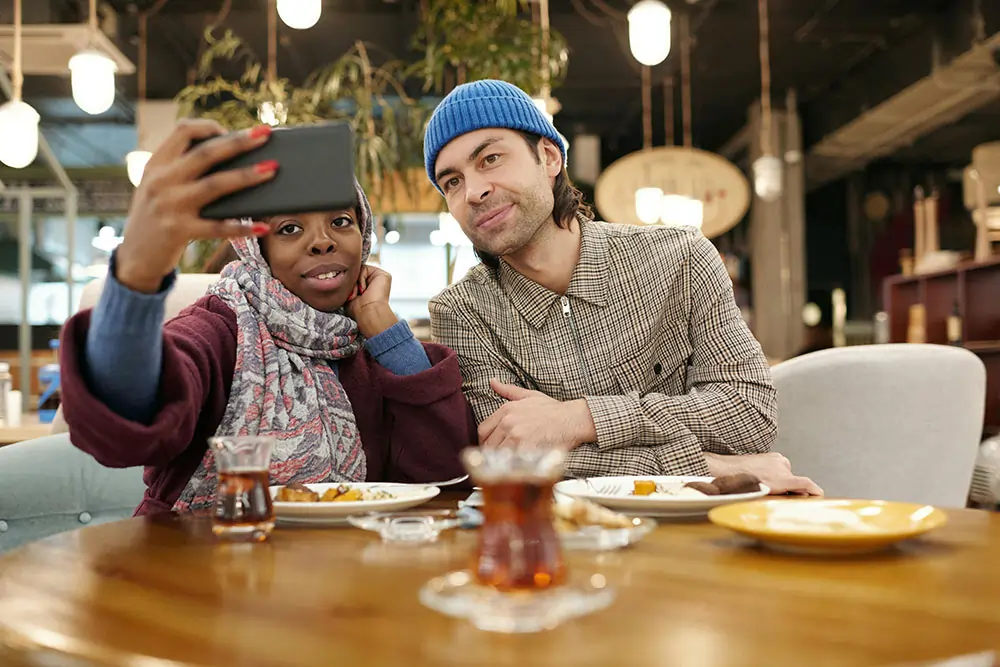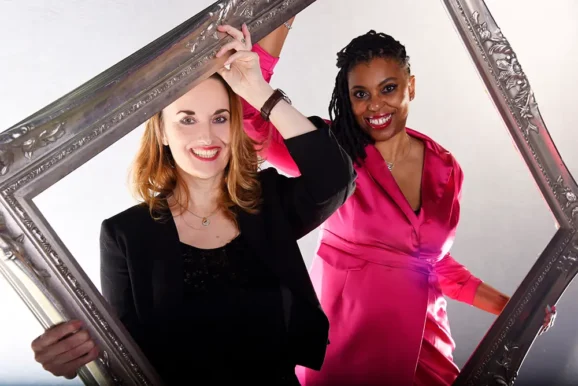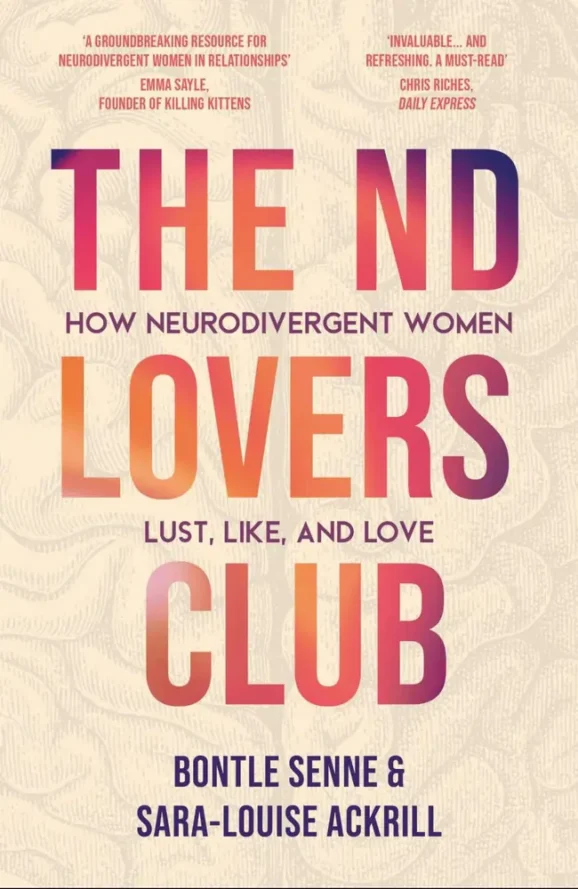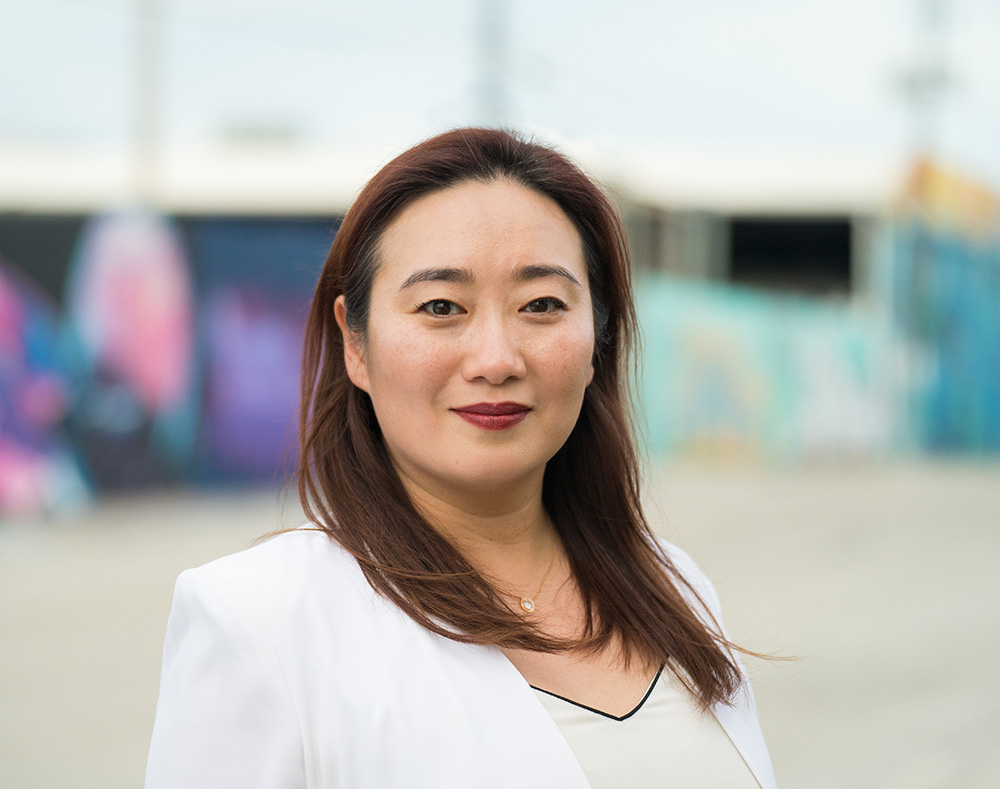Rewriting the rules of neurodivergent dating

Sara-Louise Ackrill
- Published
- Authors

Sara-Louise Ackrill and Bontle Senne are the co-authors of a new book about love and romance within the neurodivergent community. Here, they reveal how relationship norms don’t always align with ND needs and why a more authentic, self-defined approach to intimacy is needed
No one is born with a helpful instruction manual on how to date. The expectation is that, as you grow up, everyone just kind of ‘figures’ it out through a painful (but also sometimes comical) mix of trial and error. Unfortunately for some of us, our clumsy attempts at dating can persist for decades.
It’s no surprise that ND people struggle with intimate relationships when this is our experience of just interacting with people in general. Unsurprisingly, self-advocacy—learning to express needs and boundaries—is one of the most common reasons ND people seek therapy or coaching.
We often spend a lot of energy trying to fit into the idea of what’s “normal,” which can be frustrating when the same people who tell us “there’s no such thing as normal”—usually friends and family—are the ones upholding traditional expectations. These include seeing their partner frequently, living together or staying over, getting married, assuming sex is a given in close relationships, sharing finances, planning for children, and making joint decisions about where to live and what hobbies to pursue based on their schedules and jobs.
For neurodivergent (ND) individuals, these pressures manifest differently. Relationships often don’t look the same—many ND people don’t feel the need to see their partner weekly, prefer living separately or having separate bedrooms, and may be under-employed, not want children, or not see marriage as a life goal. Shared finances are less important, and the ways ND individuals connect and experience intimacy are often shaped by their unique needs and preferences.
Of course there is a commonly conceived idea of what being in a couple is; because of a common mix of logistics, careers, time constraints, biological clocks, family pressure, desire for intimacy and security and financial incentives, among other things. It’s far more helpful for everyone if we acknowledge the very thing, the norm, that neurodivergent people are diverging from in the first place.
We want to laugh at the right jokes, not get constantly overwhelmed, or erase ourselves with people pleasing; to say the right thing to comfort our partner, and know how to find the exact line between honesty and rudeness. We want to give a romantic partner what they crave (whether it’s cuddles, hand holding, little gestures of affection or kissing and so forth) even if we ourselves might be Aromantic, because we know it matters to them and to society as a whole. We would love to feel comfortable co-existing and not be hypervigilant about hygiene, or our perceived flaws, or just how to relax in someone else’s company. But this isn’t about us not making an effort, it’s about us not being of the majority neurotype.
When basic interactions are as challenging as they are for us day to day, dating can feel like the first day of a postgraduate degree before you’ve made it past secondary school. And there is a lot that neurotypical kids pick up as though by osmosis (during what are meant to be the apprentice years of young adulthood) where we as neurodivergents totally missed the memo. At that point in our lives we were both hyper-fixated on (and part crawling out of our skin into), the niche obsessions that made us ‘little professors’ and hard to connect with both back then and later on in life (to see us as neurotypical folk usually do).
Let’s look at one example: physical touch. Touching your partner seems like it couldn’t be a bad thing. It’s a love language, after all, and some people need to touch others to feel close to them. In popular media, a sweeping romantic gesture always ends in a passionate embrace. Physical closeness is the proverbial full stop to any moment of intimacy. With neurodivergent conditions though, such intimacy might feel very awkward for all kinds of reasons. Some of us have extreme sensitivity to touch. We might be hypersexual and not able to get enough touch, but we may also be hypo-sensitive and unable to bear being touched ever, let alone sexually. We may only be agreeing to a hug or kiss or even sex because we think that is what a ‘normal’ person should do and clearly this makes us pretty vulnerable much of the time and prone to making poor choices. In an ideal world, we would all appreciate that sensory integration issues and our different frames of reference make a huge difference to what touch means for us, and that is OK.
Spending time with our partner may also look different. We frequently enjoy parallel play or doing different things in the same physical space. Being ‘alone’ while together may seem incredibly antisocial, but we’re often happiest when we get to read a book while someone else does a video call with their family. Our oft-tense muscles are melting here just thinking about it!
The constant effort to navigate the new boundaries of romantic relationships is its own mental trapeze act before we get into the more specifically ND stuff. Are we seeing each other or dating? Are we exclusive yet, or is this just casual? Are you my dream man, or am I your next target? For a neurodivergent person, the cognitive effort of trying to look like we’re not overthinking sometimes comes at a physical as well as emotional cost. But our hypervigilance and lack of psychological safety in the world means we can’t not overthink.
It’s actually fascinating how much energy we waste on dancing around what we really want or need. In professional contexts, we’re often quite clear about objectives and boundaries, but in personal relationships, there’s this expectation of mystique or game-playing that NDs find exhausting and counterproductive. Bontle believes this is a partial explanation of why our community is more likely to have non-traditional relationships that involve kink or more than one person. The rules in those communities are clear and explicit. Everything is pre-arranged and agreed. There is no guessing what happens next. The overt communication and contracting with each other is a pool of clarity in a confusing social world.
Sometimes, Sara-Louise finds herself dissociating from her body when she goes out because it can be so painful to be around people. From the constant need to explain her accessibility needs to having to prove that ADHD is a real thing and not a TikTok trend, the emotional labour of managing other people’s reactions all takes a toll that is harder going than the conditions themselves. Fortunately most of the time nowadays, with the benefit of a lot of therapy herself, she can get a lot of needs met socially and doesn’t tend to have the ‘living behind double glazing’ feeling that she had all the time pre-diagnosis.
The good news is that more awareness and representations of neurodiversity beyond Hollywood stereotypes have shown people that there are other options to faking it and never making it and surely neurotypical people could learn from this too? Instead of trying to fit ourselves into these narratives, we can all of us create new ones that better reflect our experiences and needs.
For both of us, dating within the neurodivergent community has changed everything. It’s not about having the same interests. Having similar hobbies is no guarantee of a functioning relationship. It is not a matter of matching personalities, lifestyle choices, or any other personal preferences or commonly used data points. Dating someone who is ND means dating someone with (broadly) the same set of neurological differences and a shared fundamental understanding of how you might process and experience the world differently, too.
When you date someone who’s also neurodivergent and in tune with that, there’s often an implicit understanding of certain challenges. You don’t have to explain why you need the volume to always be at the same level or why you respond to rejection in particular ways.
Despite all the challenges, there’s joy in being neurodivergent. There’s joy in seeing the world differently, in finding creative solutions to social challenges, and in building genuine connections based on authentic communication. Yes, it can be exhausting navigating a world that wasn’t built for us, but we’re also incredibly resourceful in creating our own ways of falling in love, lust, or like. Hopefully these will gain traction as a new norm.
We’ve learned to appreciate our ability to be direct, to have an abundance of optimism and creativity to keep refreshing a relationship, and the intuition to know how to create spaces where we can be both comfortable and connected. The journey isn’t about becoming more “normal” – it’s about finding ways to thrive while being exactly who you are.
The key is recognising that a difference is not a deficiency. There are many valid ways to navigate the world of dating. If no one has a handbook, living more authentically means you get to write your own rules.
Q&A with Sara-Louise Ackrill and Bontle Senne
Your new book discusses how neurodivergent women experience love, sex, and relationships differently compared to neurotypical women. What are some of the most common misconceptions or stereotypes about neurodivergent women in this context?
One of the most pervasive misconceptions is that neurodivergent women are either completely uninterested in relationships or incapable of having fulfilling ones. Stereotypes often paint us as non-sexual or undeserving of partnership, especially if there’s an additional intellectual or learning disability. On the other hand, for those of us without intellectual impairments, there’s an assumption that we’ll navigate relationships just like neurotypical people. This overlooks how connecting with others can feel confusing, challenging, and exhausting.
Other damaging stereotypes include the belief that being in a relationship with a neurodivergent woman is burdensome or requires extraordinary patience, as if it’s a one-sided effort. There’s also the misconception that neurodivergent women are easy to identify based on outdated archetypes, like the “disruptive boy” for ADHD or the “withdrawn computer enthusiast” for autism. These narratives ignore the nuanced and varied experiences of neurodivergent women, many of whom excel at masking their differences while privately grappling with the complexities of love and connection.
Rejection Sensitivity Dysphoria (RSD) is a prominent theme in your book. Can you explain what RSD is, how it can impact romantic relationships, and offer advice on how neurodivergent women and their partners can navigate it?
RSD involves an intense and often disproportionate reaction to perceived or actual rejection. It’s not just feeling left out—it’s a deep sense of failure or inadequacy that lingers far beyond the initial event. In romantic relationships, this might manifest as overreacting to minor slights or misinterpreted cues, like believing a neutral expression means disinterest or annoyance.
For partners, it’s helpful to clarify that rejecting an activity, like going out, isn’t a rejection of the person. Open communication is essential—acknowledging these triggers and reframing them can defuse tension. Therapy, particularly trauma-focused approaches, can help neurodivergent women process these feelings and reduce their intensity over time. Surrounding yourself with supportive friends and partners who validate your experiences and communicate openly can also make a significant difference.
You emphasise the importance of understanding attachment styles in relationships. How can recognising your own and your partner’s attachment style contribute to healthier and more fulfilling connections?
Attachment styles provide insight into how we respond to intimacy and closeness, helping us understand why we react in certain ways. For instance, an anxious partner might need frequent reassurance, while an avoidant partner might struggle to express vulnerability. Recognising these dynamics allows couples to work toward balance—building trust, fostering independence, and learning to compromise.
It’s important to remember that attachment issues don’t make anyone undeserving of love or responsible for others’ harmful behaviours. Understanding attachment is about identifying patterns, not placing blame, and creating a shared language for navigating relational challenges. With awareness and effort, couples can build deeper, more secure connections.
The book challenges traditional notions of romantic love often portrayed in movies and popular culture. How can neurodivergent women redefine love and relationships for themselves and create fulfilling connections that align with their personal needs and desires?
Popular culture tends to glorify dramatic, milestone-driven romances, but these tropes often don’t resonate with neurodivergent women. Our version of love might not include sweeping gestures or rigid timelines—and that’s okay. Redefining love begins with self-awareness: understanding your own needs and being unafraid to deviate from societal expectations.
It’s also about authenticity. Masking to attract partners might draw people who aren’t a good match, while being honest about your needs from the start fosters healthier and more meaningful connections. True compatibility isn’t about following a script; it’s about mutual respect and understanding, even if that means embracing unconventional relationship structures or pacing.
The book explores the challenges neurodivergent women face in communicating their needs and desires, particularly around sex. What advice do you have for neurodivergent women on how to advocate for themselves and establish healthy boundaries in their relationships?
Advocating for yourself starts with self-awareness and self-acceptance. Understanding your needs, boundaries, and preferences empowers you to communicate them effectively. It’s okay to say “no” without explanation; your comfort and wellbeing should always come first.
Healthy relationships thrive on mutual respect, not sacrifice. If a partner consistently disregards your boundaries or needs, it’s a sign to reassess the relationship. Learning to trust your instincts and prioritise your emotional safety is essential for building fulfilling connections. Sometimes, this may involve difficult conversations or even ending relationships, but valuing yourself is the cornerstone of a healthy partnership.
You debunk the myth of ‘Mr/Ms/Mx Right’ and encourage readers to create their own definitions of a fulfilling partnership. How can neurodivergent women move away from societal expectations and embrace the diverse possibilities of love and relationships?
Moving away from societal expectations starts with rejecting the idea that there’s a “correct” way to experience love. Traditional milestones—such as marriage, children, and shared holidays, for instance—might not appeal to everyone, and that’s perfectly valid. The key is to focus on what relaxes and fulfils you personally, rather than conforming to what’s expected of you.
For neurodivergent women, this might mean redefining partnership entirely. Whether it’s exploring unconventional structures, prioritising individual well-being, or embracing independence, love should feel authentic and supportive. By letting go of societal scripts and embracing the freedom to create connections that align with your unique needs, you can foster deeper and more meaningful relationships.


The ND Lovers Club: How Neurodivergent Women Lust, Like, and Love, a new book by Sara-Louise Ackrill and Bontle Senne, explores the challenges and triumphs of love, sex, and relationships within the neurodivergent community, and offers a neurodivergent perspective on common relationship issues. It is out in paperback and on Kindle on Monday, 17th February.
Main image: Courtesy Jack Sparrow/Pexels
RECENT ARTICLES
-
 Afore SURA awarded Pension Fund Management Company of the Year 2025
Afore SURA awarded Pension Fund Management Company of the Year 2025 -
 BOV Fund Services Limited wins in The European Banking & Finance Awards 2024
BOV Fund Services Limited wins in The European Banking & Finance Awards 2024 -
 Amberdata wins two titles in The European Banking & Finance Awards 2024
Amberdata wins two titles in The European Banking & Finance Awards 2024 -
 Ajman Bank wins in The European Banking & Finance Awards 2024
Ajman Bank wins in The European Banking & Finance Awards 2024 -
 Creditú wins three titles at The European Banking & Finance Awards 2024
Creditú wins three titles at The European Banking & Finance Awards 2024 -
 Krungthai Bank PCL wins five awards in The European Banking & Finance Awards 2024
Krungthai Bank PCL wins five awards in The European Banking & Finance Awards 2024 -
 Oakridge Property Group wins at The European Global Business Awards 2024
Oakridge Property Group wins at The European Global Business Awards 2024 -
 Old Mutual Investment Group wins two titles at The European Global Banking & Finance Awards 2024
Old Mutual Investment Group wins two titles at The European Global Banking & Finance Awards 2024 -
 AXA IM Select wins at The European Global Banking & Finance Awards 2024
AXA IM Select wins at The European Global Banking & Finance Awards 2024 -
 Zenith Bank Ghana wins five titles at The European Banking & Finance Awards 2024
Zenith Bank Ghana wins five titles at The European Banking & Finance Awards 2024 -
 SeABank awarded The Risk Management Bank of the Year - Vietnam 2024
SeABank awarded The Risk Management Bank of the Year - Vietnam 2024 -
 Vista Land & Lifescapes Inc. wins three titles at The European Global Business Awards 2024
Vista Land & Lifescapes Inc. wins three titles at The European Global Business Awards 2024 -
 Boursa Kuwait wins two titles at The European Global Sustainability & ESG Awards 2024
Boursa Kuwait wins two titles at The European Global Sustainability & ESG Awards 2024 -
 Gulf African Bank wins four titles at The European Banking & Finance Awards 2024
Gulf African Bank wins four titles at The European Banking & Finance Awards 2024 -
 Gulf Insurance Group awarded two Global Banking & Finance titles for 2024
Gulf Insurance Group awarded two Global Banking & Finance titles for 2024 -
 Eccelsa Aviation awarded three Global Business 2024 titles, including Best FBO Brand – Europe
Eccelsa Aviation awarded three Global Business 2024 titles, including Best FBO Brand – Europe -
 Afore Sura awarded Pension Fund Management Company of the Year 2024
Afore Sura awarded Pension Fund Management Company of the Year 2024 -
 Toledo Capital AG wins Best Boutique Wealth Management - Family Office 2024
Toledo Capital AG wins Best Boutique Wealth Management - Family Office 2024 -
 Banco de Chile awarded four Global Banking & Finance 2024 titles, including Bank of the Year - Chile
Banco de Chile awarded four Global Banking & Finance 2024 titles, including Bank of the Year - Chile -
 Kontora Family Office GmbH awarded Best Wealth Management Services - Germany 2024
Kontora Family Office GmbH awarded Best Wealth Management Services - Germany 2024 -
 Banque Misr awarded five Global Banking & Finance 2024 titles, including Best Banking Brand - MENA
Banque Misr awarded five Global Banking & Finance 2024 titles, including Best Banking Brand - MENA -
 Krungthai Bank PLC wins five awards in The European Banking & Finance Awards 2023
Krungthai Bank PLC wins five awards in The European Banking & Finance Awards 2023






















